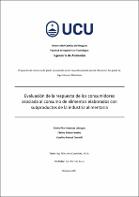JavaScript is disabled for your browser. Some features of this site may not work without it.
Evaluación de la respuesta de los consumidores asociada al consumo de alimentos elaborados con subproductos de la industria alimentaria
Fecha
2021-10Autor
Serrantes Laforgue, Maite Pilar
Prisco Ferreira, Fátima
Pontet Tornielli, Carolina
Metadatos
Mostrar el registro completo del ítemResumen
A growing and worldwide concern over environmental issues has been shown by the public in recent years (Funk, Tyson, Kennedy & Johnson, 2020). The current food system contributes to green gas emissions, climate change and food waste production for which it is not exempted from criticism (Eldesouky, Mesias & Escribano, 2020). Unless multiple innovative changes are introduced, food systems negative impact on the environment would increase to the point where Earth would no longer be “a safe operating space for humanity” (Springmann et al., 2018). It is thus urgent for the food industry to adopt new and more environmentally friendly practices. Brewer’s Spent Grains (BSG) is the most important by-product of the brewing industry representing an annual generation estimated of 38.2 million tons. Its adverse impact on the environment and the additional costs involved in its treatment can be avoided if upcycled and used as a functional ingredient due to its high fibre content. Therefore, the aim of this study was to investigate consumers’ acceptability and emotional response to different food products containing BSG as an alternative sustainable ingredient. Additionally, the impact of extrinsic information on consumers’ response was also evaluated on another circumstance. Information about BSG’s sustainability and nutritional credentials was presented to participants through the labels. A key objective was to understand the contribution that measuring emotional response would reveal. While the first chapter focuses on the formulation of BSG-enriched products and consumers’ blind perception of them, the second one addresses the impact of extrinsic information on its marketability.


